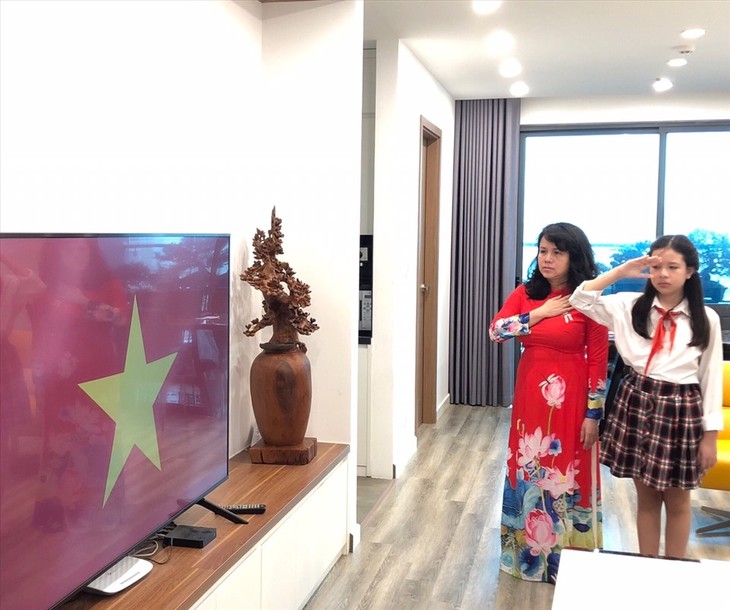(VOVWORLD) - Because many localities have continued to impose social distancing rules to prevent the spread of COVID-19, a new academic year has begun online. Teachers and pupils interact with each other on virtual classrooms. Teaching and learning methods have been adjusted for continuing education from home.
 A family attends an online new-year opening ceremony. (Photo: Lao Dong newspaper) A family attends an online new-year opening ceremony. (Photo: Lao Dong newspaper) |
A few localities in Vietnam, which had no COVID-19 infections in 14 days, have reopened schools for this academic year, while a majority are either half-open or subjected to online classes. Teachers have adjusted curriculums and teaching methods for online learning.
"In order to give attractive lectures and engage pupils in virtual classes, teachers have to learn new IT applications to redesign teaching activities," a teacher suggests.
Another teacher shares her experience: "We try to encourage pupils’ interactions. For example, we divide them in to small groups for discussion. The teacher will join each group chat to talk with them.”
Children in grade 1 have faced a range of challenges while they are subjected to online classes or remote learning. The kids, who need direct help holding pens, sitting properly, and writing, now have to concentrate on a screen. Teachers have to adjust their approach for students and keep close contact with their parents.
Nguyen Thi Lan Phương, Rector of Phu Do Primary School of Nam Tu Liem district, Hanoi said: “In order to help grade 1 students learn well online, parents should prepare necessary equipment and a good space at home for their children to study. The teachers will instruct parents and students to use study applications so parents can accompany their children at the beginning.”
The COVID-19 pandemic will continue, we have to change and adapt to and co-exist with it. The educational sector has also mapped out approaches depending on the pandemic situation.
The Ministry of Education and Training has also changed academic evaluation criteria for pupils from grade 1 to 12. Minister Nguyen Kim Son said: “We’ll not organize exams or tests for remote learning on television or online from grade 1 to 12. Only when students can return to school, we will review their knowledge to further train and supplement, and evaluate. Television training programs are useful for children who cannot learn online. They can learn as much as they can.”
The Ministry of Education and Training has produced a digital database of lectures and books for teachers to use while remote teaching. The government plans to vaccinate students against COVID-19 so they can return to school with less risks.